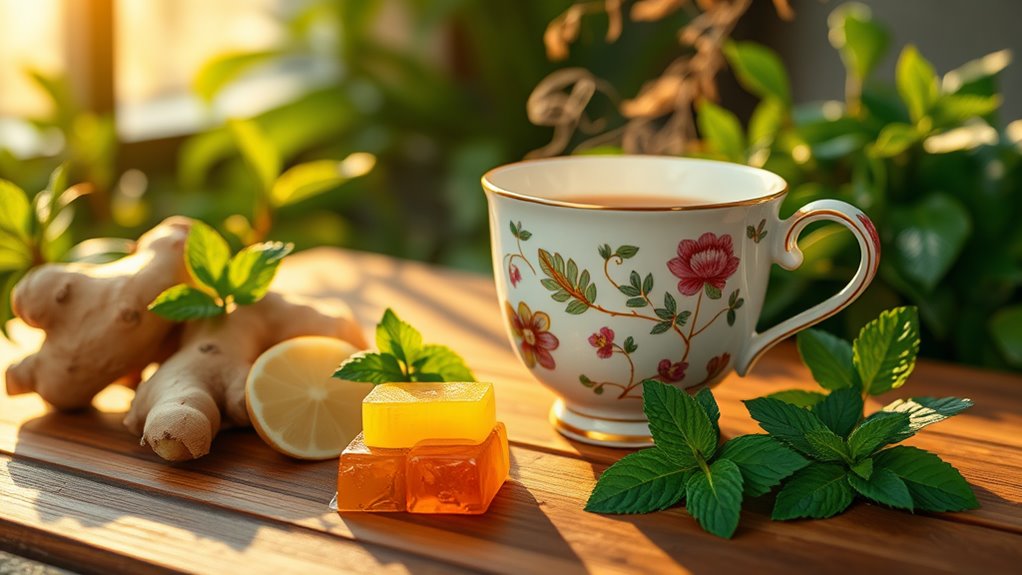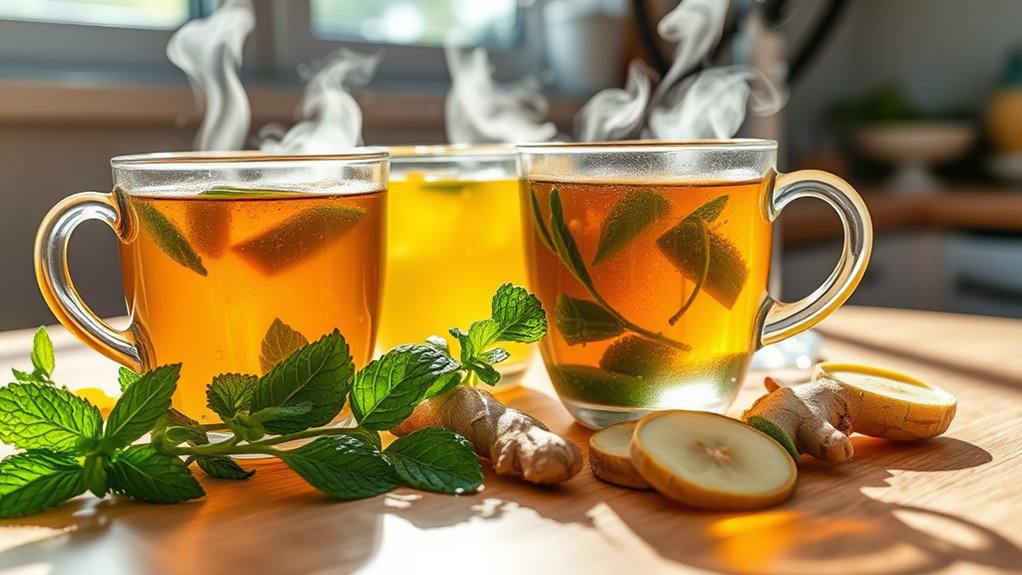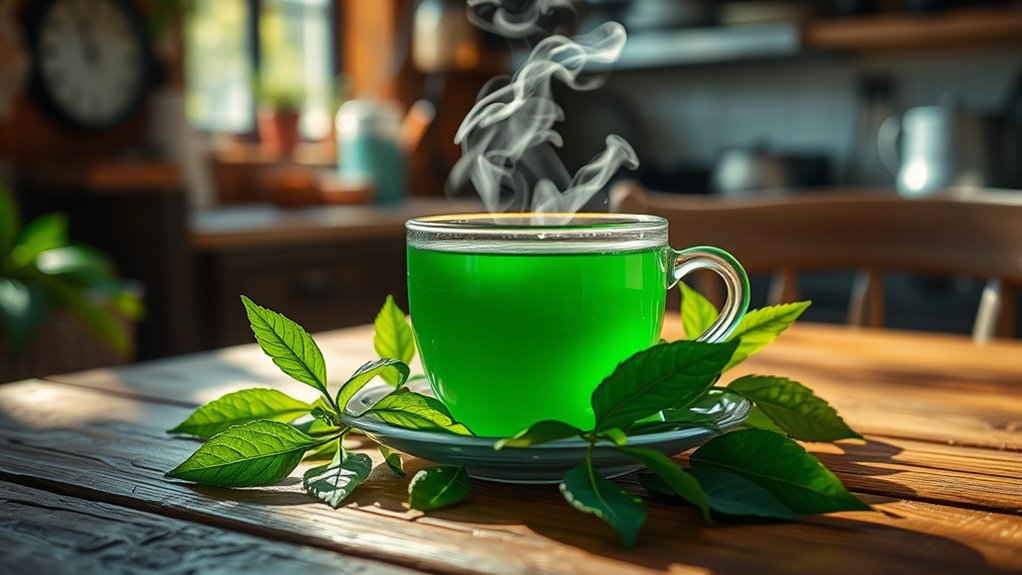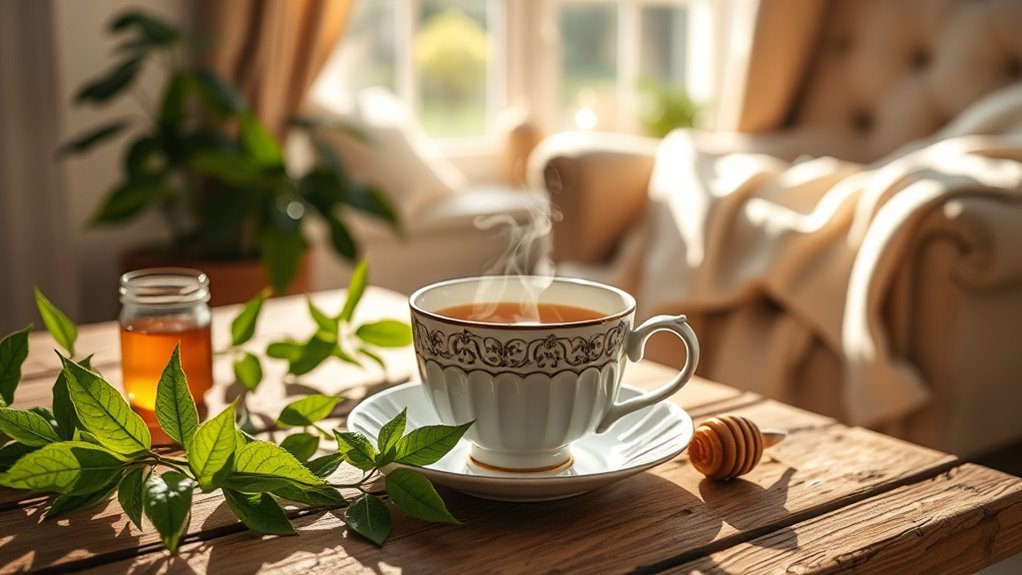A Daily Tea Ritual That Supports Better Digestion
Think of your digestive system as a delicate orchestra, where each herb plays a vital note. By incorporating a daily tea ritual, you can fine-tune this harmony and support your gut health. Specific herbs like chamomile and ginger have shown benefits, but the key lies in how you prepare and time your tea. Curious about how to maximize these benefits and create a routine that fits your lifestyle?
Key Takeaways
- Start your day with herbal tea, like ginger or peppermint, to kickstart digestion after waking.
- Enjoy tea 30 minutes post-meal to enhance digestion and alleviate discomfort.
- Incorporate a calming evening tea ritual, such as chamomile, to promote relaxation before bedtime.
- Personalize your tea blends with additions like lemon or honey for enhanced digestive benefits.
- Maintain hydration and practice mindfulness during tea consumption to support better digestion overall.
The Importance of Herbal Tea for Digestion
Have you ever wondered how herbal tea can enhance your digestion? Incorporating a daily herbal tea into your routine can significantly improve your digestive health.
Certain herbs, like peppermint and ginger, stimulate digestive enzymes, helping your body break down food more efficiently. Chamomile can soothe inflammation in the gut, while fennel aids in reducing bloating.
Additionally, the warm temperature of tea promotes relaxation, easing digestive discomfort. Many herbal teas are also rich in antioxidants, which can support overall gut health and contribute to a balanced digestive system.
Top Herbal Tea Blends for Digestive Health
When it comes to improving digestion, choosing the right herbal tea blends can make a noticeable difference. Herbs like peppermint, ginger, and chamomile have proven benefits for digestive health, and knowing how to brew them properly enhances their effects. Additionally, incorporating various digestive herbal teas into your daily routine can further support gut health and alleviate discomfort. Let’s explore some of the best combinations and techniques to maximize your tea ritual for digestive wellness.
Best Herbs for Digestion
Incorporating the right herbs into your diet can significantly enhance digestion and overall gut health. Here are some of the best herbs you can include in your daily routine:
- Peppermint – Known for its soothing properties, it helps relieve bloating and gas.
- Ginger – This powerful root aids digestion and can alleviate nausea.
- Fennel – It promotes healthy digestion and reduces intestinal spasms.
- Chamomile – Not only calming, but it also helps ease digestive discomfort.
Adding these herbs to your meals or enjoying them as herbal teas can make a noticeable difference in how you feel.
Brewing Techniques for Benefits
Curious about how to maximize the digestive benefits of your herbal teas?
Start by using fresh, high-quality herbs, as they contain more active compounds.
Brew your tea at the right temperature; most herbal blends thrive at 200°F.
Steep for 5-10 minutes to extract essential oils and flavors.
Consider blending digestion-friendly herbs like peppermint, ginger, and fennel for a potent mix.
You can also try cold brewing, which may reduce bitterness while preserving delicate flavors.
Finally, drink your tea slowly, allowing your body to absorb the benefits more effectively.
Enjoy this ritual daily for improved digestion and overall wellness!
Preparing Your Daily Tea Ritual
To create your daily tea ritual, start by choosing herbs known for their digestive benefits, like peppermint or ginger. Next, familiarize yourself with effective brewing techniques to maximize flavor and potency. Finally, consider the timing of your tea to enhance your digestive experience throughout the day. Incorporating fast-acting digestive teas can provide quick relief for various digestive issues.
Choosing Digestive Herbs
How can you choose the right digestive herbs for your daily tea ritual?
Selecting the right herbs can enhance your digestion and overall well-being.
Consider these options:
- Peppermint: Known for its soothing properties, it can relieve bloating and gas.
- Ginger: This anti-inflammatory herb aids in reducing nausea and stimulates digestion.
- Fennel Seeds: They help relax your digestive muscles, easing discomfort and gas.
- Chamomile: Renowned for its calming effects, it can also alleviate digestive issues.
Incorporating these herbs into your tea can create a delightful and beneficial ritual that supports your digestive health.
Brewing Techniques Explained
Once you’ve selected the right digestive herbs for your tea ritual, the next step is mastering the brewing techniques to maximize their benefits. Proper brewing not only enhances flavor but also extracts essential compounds that aid digestion. Here’s a quick guide to help you:
| Herb | Water Temperature | Steeping Time |
|---|---|---|
| Peppermint | 200°F (93°C) | 5-7 minutes |
| Ginger | 210°F (99°C) | 10-15 minutes |
| Fennel Seeds | 200°F (93°C) | 5-10 minutes |
| Chamomile | 200°F (93°C) | 3-5 minutes |
Experiment with these techniques to find your perfect brew!
Timing Your Tea Ritual
When should you set aside time for your tea ritual to reap the digestive benefits?
Consistency is key, so try to incorporate your tea ritual into your daily routine.
Here are some ideal moments:
- Morning: Kickstart your digestion after waking up.
- Post-Meal: Sip tea about 30 minutes after eating to help with digestion.
- Afternoon Break: Enjoy a calming tea to reduce stress, which can impact digestion.
- Evening Wind Down: A soothing herbal tea can promote relaxation before bedtime.
Timing Your Tea for Optimal Digestion
Are you wondering when the best time is to sip your tea for optimal digestion?
To enhance digestion, enjoy your tea about 30 minutes before meals. This timing helps stimulate digestive enzymes and prepares your stomach for food.
If you’re experiencing bloating or discomfort, sipping herbal teas like peppermint or ginger after meals can provide relief. Additionally, many herbal teas contain natural ingredients that can further support digestive wellness.
It’s also beneficial to avoid tea right after eating, as it may interfere with nutrient absorption.
Additional Tips to Enhance Digestive Benefits
To truly maximize the digestive benefits of your tea ritual, consider incorporating a few additional tips into your routine. These practices can enhance your tea’s effectiveness and support your digestive health.
- Stay Hydrated: Drink plenty of water throughout the day to aid digestion.
- Mind Your Portions: Avoid overloading your stomach; smaller meals can improve digestive efficiency.
- Pair with Fiber: Include high-fiber foods, like fruits and vegetables, to complement your tea.
- Practice Mindfulness: Focus on your tea and meals, as mindful eating can enhance digestion. Also, consider enjoying fermented foods alongside your tea, as they provide beneficial probiotics that support gut health.
Personalizing Your Tea Ritual for Maximum Effects
Personalizing your tea ritual can significantly enhance its digestive benefits, allowing you to tailor your experience to your unique preferences and needs. Consider the type of tea, infusion time, and additional ingredients that can boost digestion. Additionally, incorporating soothing herbal teas into your routine can also promote relaxation and improve overall well-being.
Here’s a quick guide to help you:
| Tea Type | Infusion Time | Additions |
|---|---|---|
| Peppermint | 5-7 minutes | Ginger, honey |
| Ginger | 10-15 minutes | Lemon, cinnamon |
| Chamomile | 5-10 minutes | Fennel seeds |
| Green tea | 2-3 minutes | Mint leaves |
Experiment with these combinations to find your perfect blend!





